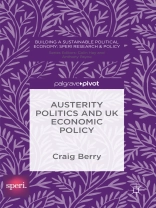Craig Berry assesses UK economic policy in the wake of the financial crisis through the lens of the austerity agenda, focusing on monetary policy, economic rebalancing, industrial and regional policy, the labour market, welfare reform and budgetary management. He argues that austerity is geared towards a resurrection of financialisation and the UK’s pre-crisis economic model, through the transformation of individual behaviour and demonisation of the state. Cutting public spending and debt in the short term is, at most, a secondary concern for the UK policy elite. However, the underlying purpose of austerity is frequently misunderstood due to its conflation with a narrow deficit reduction agenda, not least by its Keynesian critics. Berry also demonstrates how austerity has effectively dismantled the prospect of a centre-left alternative to neoliberalism.
Содержание
1. Introduction: Austerity and Growth.- 2. Financialisation and the Property-Owning Democracy.- 3. Industrial Decline and the Myth of Rebalancing.- 4. Welfare Retrenchment and the Perversion of Full Employment.- 5. Deficit Reduction and Budget Irresponsibility.- 6. What’s Left?.- 7. Conclusion.-
Об авторе
Craig Berry is Deputy Director of the Sheffield Political Economy Research Institute at the University of Sheffield. He has worked previously at the Trades Union Congress, International Longevity Centre, HM Treasury and the University of Warwick. His research focuses on UK economic statecraft, with an emerging focus on Northern England in a European and global context.












